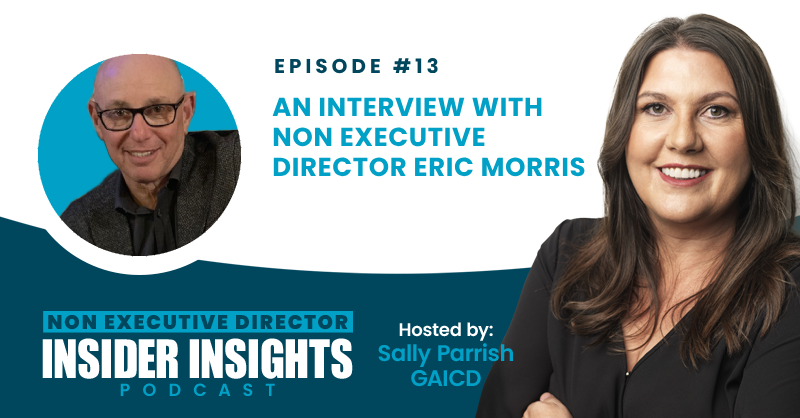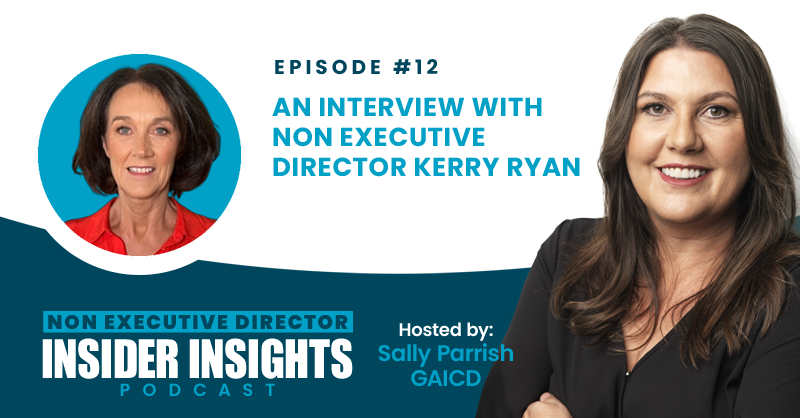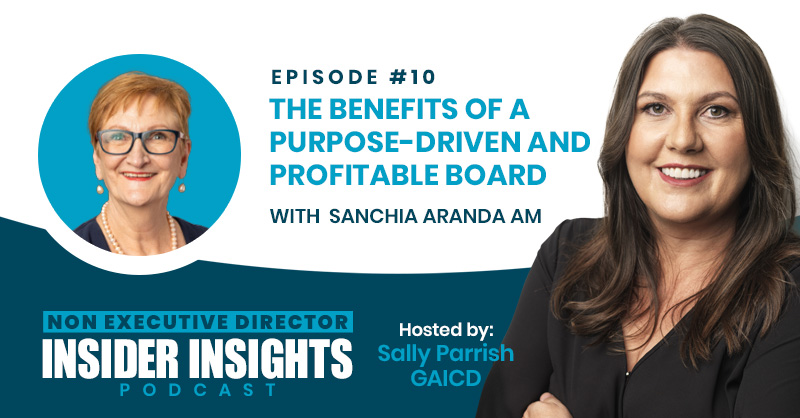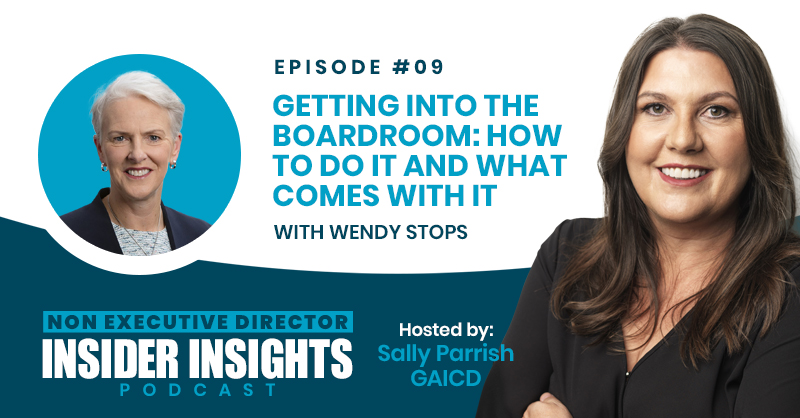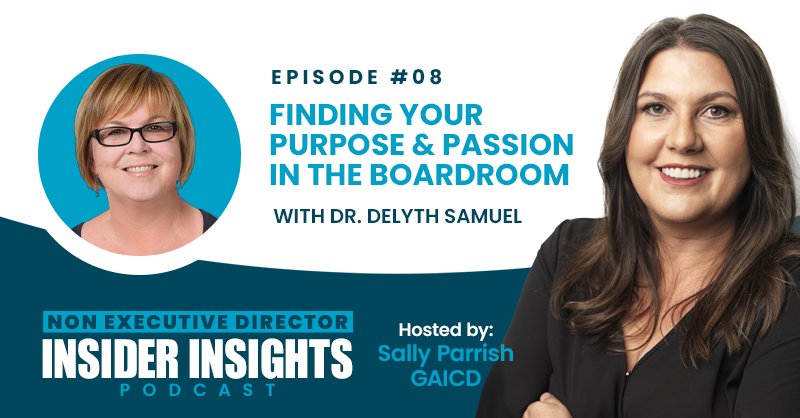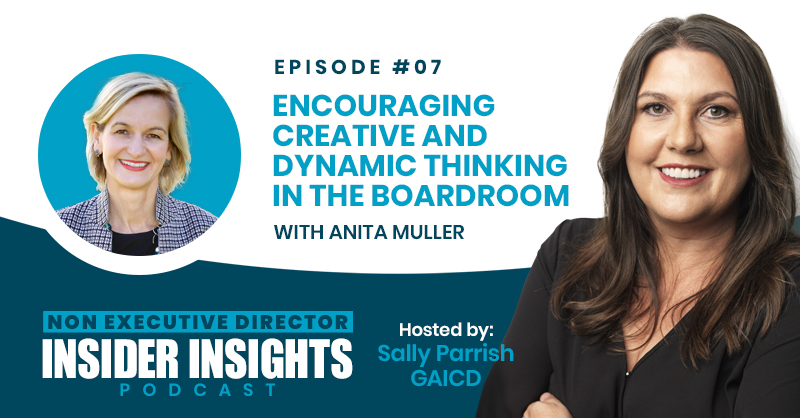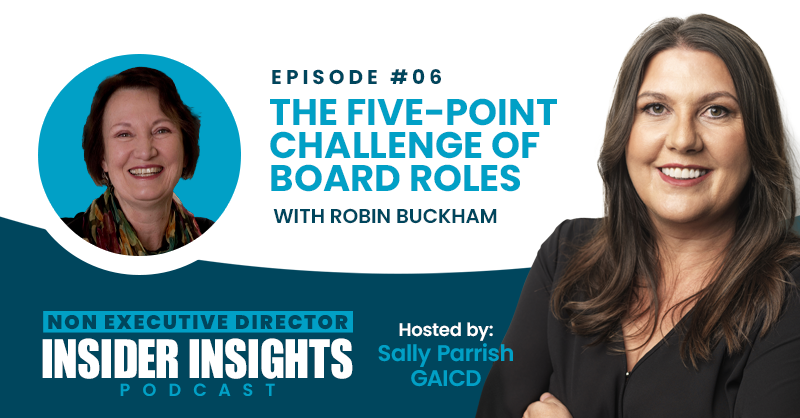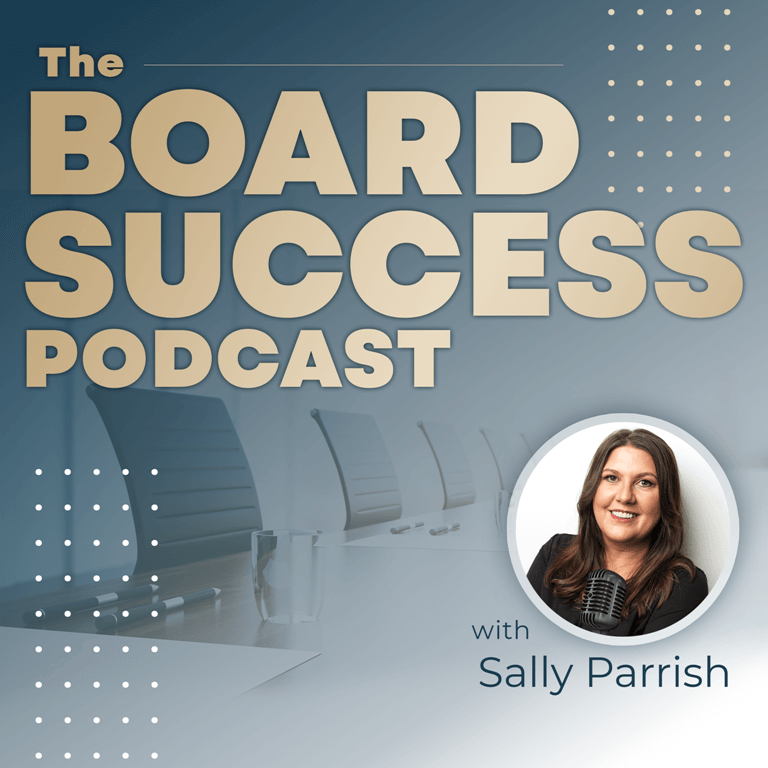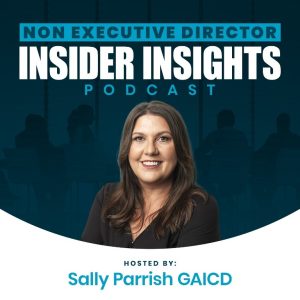Insider Insights Podcast Interview with Rob Hale
Episode 11: An Interview with Non Executive Director Rob Hale
Sally Parrish interviews Rob Hale
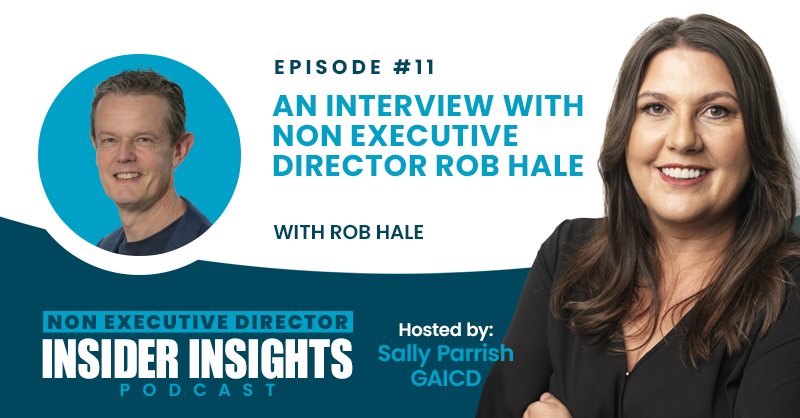
At the time of this recording, Rob Hale had just launched his board career by stepping onto the board of Summerland Credit Union. An impressive first move for a CTO and leading Tech Exec and a role which was squarely in his wheelhouse!
I was especially excited to make this episode. I meet Rob when he signed on to my Board Success Mastermind in 2021 and I am a big fan of his. Rob is a passionate, authentic and innovative exec and his kind and gentle nature is very much a key to the massive impact and influence he has in the technology space.
FURTHER INFORMATION:
Meet Rob on Linkedin: https://www.linkedin.com/in/halerob/
Click Here to View the Podcast Interview Transcript with Non Executive Director Rob Hale
Today we're joined by Rob Hale, who will give us his unique perspective of board life, and offer up some hints and tips to help you to succeed too. Rob is the Non Executive Director on the board of Summerland Credit Union. He's on the University of New England Computer Science Industry Advisory Board, the Consumer Data Standards Advisory Committee, and he also serves on the Regional Member Council for the Australian and New Zealand chapter of the Financial Data and Technology Association. Join me now and let's hear from our insider, Rob Hale.
So Rob I've been so excited about making this episode. I get to speak to some fabulous NEDs in this podcast. But there is nothing more exciting to me than having a board star on the program. So welcome and thank you so much for joining us today.
Rob Hale (01:06):
Thank you, Sally. Great to be here.
Sally Parrish (01:09):
Now, I am loving your story, because there were just so many insights and ahas along the way and I just loved watching your transition. So I'm really excited to share this with all of our listeners today. We've been working together coming up to two years now. Would that be around about right?
Rob Hale (01:35):
Yep. I think that's about right.
Sally Parrish (01:37):
So about two years. And so take us back to when we first met, you had an incredibly successful executive career. What were you doing at the time that we started working together?
Rob Hale (01:48):
Yes, that feels like a lifetime ago. But that was a couple of years ago. I was Chief Digital Officer at Regional Australia Bank, that's a customer owned bank. I spent a lot of time engaging with the board of the bank, observing what they did and it looked really interesting. I was fortunate that I had a CEO who supported my curiosity there and encouraged me to think about a board career. So I think that was the catalyst for us to start talking. I noticed there was a lack of tech and digital skills in many boards that was starting to be talked about more and more, cyber and things like that, were becoming more talked about. And I felt that maybe there's something for me here that I could use that knowledge, that skill, that experience I've gained as an exec at board level. So I think that was probably how it all started.
Sally Parrish (02:48):
Yeah, and I think if we go back, that was before the big breaches on the front pages of the AFR, right? So this was at the time where we all knew that there was a gap at board level for tech expertise. But there was no way of really bridging that gap. We're going to talk today about how you've got techs with a certain skill set that doesn't necessarily translate well to the board, and what people with tech backgrounds can do in order to tap into their skills and experience.
So let's go back then to your board break. What was the defining moment for you? As you look back, what would you say the big board break was?
Rob Hale (03:33):
Well, I mean, we travelled a little along the road ourselves. And you'd help me realise that I need to define what it was that I could give, what my board value proposition was. So I knew I wanted to do something in Tech, I knew I wanted to add value. I knew I wanted to help translate from that tech world, to the business world, form that bridge, help people understand how technology can help solve problems, and understand the risks associated with that technology. Obviously, that's very important at board level and how to manage those risks, and not be afraid of technology, not fear technology. I view it as an enabler.
So I think once I've worked all that out, and that takes a long time. As you know, it took me a long time to work it out. It sounds easy now, but it wasn't easy. It was really hard. But it was a matter of working that out, working through it, refining it as I went and then just waiting. Waiting for that moment when I heard about something. I was fortunate that I've got a great network of people in business and technology roles at board level. Someone mentioned to me that there was this position with a customer owned bank and other mutual that was specifically looking for someone who had technology skills, skills around cyber, skills that could help them progress their own strategic agenda, but at board level.
So immediately this felt like, this is my moment, this is the opportunity for me. I've done that thinking, I'd worked through what it was I was looking for. I had a very congruent explanation to make. I could speak very freely and very easily and very comfortably about what I could do. But I was also very familiar with that business, with the financial services that this was in. So that was really helpful for me. Everything aligned. But having said that, despite everything aligning, it was still very challenging, very unnerving, quite confrontational for me to go through that process, despite having all the signals and signs that this was the right thing for me.
Sally Parrish (05:47):
Yeah. And that's a really important point, right? Because for anybody listening, Rob was in tech, and he wanted to get into boards. And then he realised that he had value in tech to offer the boards. It's kind of like, that's so obvious.
But the difficult part of it is, how do you add value in that tech space, at board level? So if we look at the evolution of the modern day board, in the past, not too long ago, there was no understanding of tech requirements. We used to talk about tech in business and we know now that every business is a tech business, right? Whether it's a fintech or a biotech, every business now is a tech business of some kind of thing, even if that's just managing customer data, that's a tech business. And then we got to the stage where, we knew that the board needed to be asking tech questions, but they didn't really know who to ask, or the right questions to ask. We had this big kind of gap.
Where we are now is that the board are really well versed in their responsibilities, a lot of legislation coming in now that makes it really crystal clear what our responsibilities are at board level around tech. And what we have now is this sea of execs who have tech skills, vying for these role - “I can help you, because I'm in tech, I can help you because I'm in cyber”. But it goes much deeper than that. It's really tapping into who you are, what you value, what you love, what you can bring, what you can do, what you can offer, that potential that you bring to boards. I remember us talking about your purpose, and you getting really clear about, put the tech to the side, I'm really here about helping people, I'm the voice of the customer. And I'm not sure if you were in the open banking and the data space that you're in now, or if that led to this. So you'd certainly taken a deeper dive, but what was that realisation for you?
Rob Hale (08:08):
Yeah, you're absolutely right, Sally, I just love helping people. I get a kick out of it. It doesn't matter what level in an organisation you're at, you can help people in any role. Being on a board, it's a team sport, we're helping each other understand something. One person might have a particular skill set that's more developed in. I actually joked with my board at the interview, I said, if you're looking for someone to do forensic analysis of a balance sheet, that's not me. I can read a balance sheet, I understand it, but I'm not that person. I think that's really important. So that clarity was there.
One of the things I love doing is helping people. So if I've got the ability to translate between that business world and the tech world, and sit in the middle and help people understand, help tech people understand that this is the business problem. This is why we need to work on this thing. It's going to be really challenging. But if we do these things, and if we do them, well, we’ll actually solve this problem. And you'll help all these people and provide this great solution. And for business people, it's simulated. Don't worry about event driven architectures, and API's and integration, all that stuff, just give us a period of time to do these things. We need to buy these platforms or these products and services so that will enable these things to then happen. That will then help us, as an organisation to be able to achieve these strategic objectives or goals, whatever it might be.
But sitting in the middle you I mean, I joke about it's the Babel fish in my ear. If anyone doesn't know that, I had Douglas Adams Hitchhiker's Guide to the Galaxy, that translates from one language being spoken externally so that I can then understand what people are saying. So I think that I'm lucky, I've got this babel fish in my ear, and I can hear what people are saying. And if I have listened carefully, and I want to understand what people are saying, I can help them likely translate that into that other world.
Sally Parrish (10:13):
I want to really break this down because I just think this is a massive aha. I know it was for you and I know it's going to be for lots of people listening - that value proposition, that thing that you have to offer is so critical. Once you nail that, you know where you're going to add value. Speaking to that is really easy, like being in an interview and explaining the thing that you're doing and why it adds value is so simple. It's like, we were able to do this, and we would have an opportunity for that and it just makes people lean in.
If we can just dissect your board value proposition for a moment, because it's almost like, there's a Venn diagram, and it was the sweet spot in the middle of all of these things.
First of all, we've got the translator. So it's not just about being a techie, but being able to bring that tech information to life, so that you can have informed discussions and decision makings around opportunities, around threats, around timelines. I know, one of the problems that we have in technology as an industry is that technology is often viewed as a project - “Let’s get this new system in, and then we're done. Let's just do that and then we're done.” We don't really have that long term view. It's actually an ongoing expense. We stop spending money on tech, we're dead as a business, right? We're absolutely dead. So we need to stop moving from the project, let's get all the resources around the project plan, let's understand it, let's implement it, let's do it. And lots of things happen in silos, right?
But seeing tech across the organisation, that was one of your strengths - the translator being able to say, okay, yes, so, we need this, but we also need this and we need that, and some of this as well. You could have these really great conversations where you could take very detailed, complex technical information, and present it at a level where, lay people like myself could understand what that meant.
So we've got the translator in you. We've obviously got the tech as a passion. You live, breathe and sleep tech, right? You're a nerd. That's what you told me. You're techie. You got a real good phrase, from nerd - remember that phrase?
Rob Hale (12:41):
From nerd to ned. Yeah, that was it.
Sally Parrish (12:45):
You're a nerd in tech, you're passionate about tech. But then you've got the industry where you love to play, which is financial services. That's your home… banking, financial data, so you know where home is. But also, you know, this spin that you want on that, so you wouldn't feel comfortable in an aggressive financial service organisation that made money at any costs, right? You're not that person, you realise it was all about helping people.
So the NED role that you landed, this Summerland Credit Union, enabled you to bring all of those things. Your ability to translate the opportunities and the threats, the strengths and the weaknesses, your passion for tech, which really takes the effort out of the role as not to dismiss how much hard work there is involved in being a NED and we'll probably unpack that as we go. But it does make it more enjoyable and less arduous when you're doing what you love - working in financial services but at the heart of all of this is helping people, mutual Banking is the voice of the beneficiary.
Rob Hale (13:57):
That's so true. Customer banking as a movement, it's all about helping people. It's people before profit. Mutual banks, customer owned institutions, typically are member based and unlike listed banks who have the tension between delivering to the needs of the shareholder and trying to deliver to the needs of the customer and trying to constantly wrestle with that customer, makes the customer an institution, that it's all for the customer. So there is never that tension inside those organisations. The question is always, will this help our members, will this help our customers?
I spent some time working around open data, data sharing that was consented. That's the consumer data idea in Australia. Something I'm heavily involved with is about enabling the consumer to be in control of their data, to share it with whom they wish for whatever purpose they wish for whatever period of time they wish, Then when any of those things has change they're able to control whether that sharing stops.. So that touches on a topic of data ethics, and how we behave and how we share terms or conditions with consumers before they receive a product. There's that very technical moment when if I want that product, maybe I'll do more than I should to get that product, if that means ticking the box for terms and conditions. That means accepting something that I wouldn't ordinarily be comfortable with. But it's the only way I get that end product. Then there's an ethical decision based thing happening there. And we as business owners, we need to be careful that we're not taking advantage of someone's desire and need for a product or service and we were behaving ethically and morally and appropriately. Customer owned institutions value that very highly.
I think one of the things Sally, you mentioned there, which was around, if you get those things right, it's not a tough grilling in an interview, and in true story it was the first time in my whole career that I'd gone to an interview, and I was reflecting on it. I don't feel anxious about this. I don't feel nervous about this. I'm actually feeling really relaxed. It had never happened before. And I had, you know, 2 in-person interviews for the board role and I really was like chatting to my friends. I was just really comfortable talking about what their problems and issues were and what their needs were and maybe I could help with that. Such an incredible moment when you get that right.
Sally Parrish (16:37):
I think that's authenticity that does that, or there's clarity, clarity gives you confidence. And authenticity gives you permission to be yourself. So I think when we're executives trying to land our first board role, we try and mould ourselves to what we think that looks like. So they're obviously strategic thinkers, and they're obviously governance professionals. And I call it bullshit, bingo, right? But we end up with these resumes. I am a strategic thinker, and bla bla bla bla bla was so you bloody should be right? You're on a board, you should be WHO ARE YOU REALLY? And I think, if you look at the other people that that board was interviewing at the time, they're all coming in saying, you know, I'm a strategic thinker. And I'm passionate about mutual banking and then you come in and say, “Well, you know, open banking, and they're like, Wait, one, what that's exciting. Tell us a bit more about that. And you can speak about what you love. And it makes it really comfortable. But I want to say, you did grapple with that when we identified this as your board value proposition. You did challenge me on it, because it was too simple, too easy, too obvious. Want to talk about….? Why did you struggle with that?
Rob Hale (17:57):
I don’t know why I struggled with it, but I did. I think lots of people do, if there's something that you're naturally drawn to that you enjoy doing, that maybe you're quite good at, how on earth can that be of value to someone else? That's just what I do for fun, I can't possibly make a career out of that can I? And I remember you saying, it's the thing you probably don't value the most that you do, because you really enjoy it, that perhaps a board is looking for in you, If you can define what that is, and then put that out there, if they are open to that and giving you the signals that no, this is what we want, we want that thing that you do, that could have been a great combination. So I struggled to believe that what I could do, actually had that value, that intrinsic value.
Sally Parrish (18:54):
We use the phrase genius zone, but you're too humble a human being to ever call that genius zone for you, right? But we do, we'd belittle it like everybody can do this, or it's so insignificant, it's not relevant. And this is how I talk about, getting shoulder tapped, if anyone wants to ask me, Do you know anyone that would be good on a board that has a passion for people, in open data, I'd be going. have you spoken to Rob Hale yet? He is the first choice, the only choice, the natural choice, the best choice, and it's how you get shoulder tap, I've got no doubt. So you've got this incredible board portfolio ahead of you or any direction you want to go. You might decide now that you want to use these skills, in an executive capacity or consulting capacity for you know now that you know what you're leading with, and you know that the value that has, for everybody else, thank you for sharing that. I think that's a really important insight for anybody listening.
Let's move on to your role as a NED, so you’ve been there for six months now, what do you think is the biggest challenge of being a Non Executive Director?
Rob Hale (20:10):
There are plenty. I think if you're also in an executive role at the same time, that's something particularly in tech, again, not wanting this to be all about tech. But this tech is such a fast moving space. I remember the chair, saying to me, I want someone who's in a role today, in an exec role. It's okay, I know, that means you're going to have to balance your availability, and we'll have to work around that. But you're going to be at the coalface, you're going to be feeling the same pressures that the management team are feeling, you're going to be able to understand or relate to those, and that will help in your board roles. So technology is moving at such a pace that five years ago, we weren't dealing with the same things we're dealing with today. So, you know, a crusty old board member who used to work in IT a decade ago isn't really going to be as relevant in today's digital environment. So I think that one of the challenges is to remain relevant. And that typically means staying very actively engaged with technology, particularly in the realm that your board role covers. So that's probably one of the biggest ones for me. However, there's a good news story there. And we talked about this earlier that the fact that yes, that executive experience brings value to the board role, because you have that sensitivity, awareness and empathy for what's going on. But it also works the other way, I've learned so much about how a board operates that my understanding of what a board needs from an executive team is now elevated. So if I need to prepare a report for the board, I know what things they're going to worry about, they're going to worry about that risk and governance and compliance. Are we doing the right thing? Are we drifting away strategically from the direction we wanted? Are we in danger of bumping into some headwinds around legislative obligation? So all those things help that conversation both ways, I think, but it is, it is a balancing act. So that's probably one of the maybe two big things, one of the major challenges for me. Another would be switching context between the two. Because I love the detail, I love being involved. I think your phrase is, noses in and hands out and I had to consciously transition, when I was about to have a board meeting. If it's in person, it helps because there's typically a transition period where you're driving somewhere or flying somewhere,
Sally Parrish (22:49):
and a physical environment.
Rob Hale (22:51):
That's right. So you're physically, there's a transition period there. It's really hard in an online world where you're working remotely as I do in my executive role. And then at a certain time of day, I have to switch, get a different laptop out and go and do the board role for 4 hours. That's really challenging. But that physical one's good. And I am lucky in that my boardroom is actually about a four hour drive away. And that's a great opportunity to put some podcasts on. Slow down and think about what I'm about to go into, get my head in the zone, and start thinking like a board director, instead of reacting to operational issues that you typically do as an executive. So I find that really, really helpful.
Sally Parrish (23:41):
Diving in into the action plan and the solutions and we'll have one of these and two of those, and we'll get that done by Monday. How do you go with handing over that authority to the CEO? So just, setting the direction or coaching, counselling and then being hands off? How do you cope with that?
Rob Hale (24:00):
Oh, I actually have surprised myself by how much I enjoy it. But it's quite a responsibility. You find yourself thinking really carefully before you say anything, don't say too much. Play a few words, but the high value contribution, that's what I'm trying to do. I'm really fortunate we have such a great board and management team that I'm working with, that relationship is very fluid. So if I'm reading the papers over the weekend, and I have some questions and comments, management, love the CEO, they love to share those questions upfront. It means there is no awkward moment in the board meeting. Someone had the opportunity to prepare themselves and formulate and think about the right response to that. Perhaps there wasn't enough backstory in a paper and they can just provide that context and then everybody benefits from that. So I think having a really collegiate relationship there, it's not adversarial management. We can work together and help each other. So I find it really enjoyable. Actually, it's surprised me how much fun I find board meetings.
Sally Parrish (25:12):
It sounds like a success culture. It's interesting what you said there about, being high value. When you speak, one of the things that often comes up with NED is, when you get the newbie on the board, they want to try and assert their knowledge and value by adding comments to every item on the agenda and speaking on every item, but the real value of a NED is, knowing when to speak.
Rob Hale (25:39):
I've made mistakes, I'm sure I've said too much. And I've tried not to, I'm aware of it. And I think that's important. And I've got great colleagues who have much more board experience than me. So I'm learning from their behaviour and how they conduct themselves in that setting. We all make mistakes, we're human. But we just need to learn from that and make sure that we are constantly striving to improve and be better at what we do. But yeah, that is definitely an area where I think really carefully before saying something.
Sally Parrish (26:13):
Yeah. And having feet in both camps, having that exec role and that NED role. What do you see the sort of benefits of having both? How does the exec role enhance your role as a NED? How does the NED role enhance your role as an exec, what are the benefits for you have done both.
Rob Hale (26:34):
I think, again, we're in this world where the board's accountable, responsible for so many things. In financial services, there's a lot of legislation, prudential standards around cyber and information security and risk outsourcing. You know those intimately as an executive, because we need to comply with those. And we need to make sure that our processes and systems are appropriate in order to comply with those things. But as a board member, you want the evidence that you want to know, what are we doing to make sure we're meeting our obligations? Show me the evidence, help me understand that we are doing everything we need to to comply with that. So just knowing that there are those two sides, and we can help each other. So when you're writing a report, put those things in, put the risks in, don't shy away from highlighting risks, but show how we're addressing them with behaviour or controls, to a point where we're mitigating them sufficiently for the appetite. And then as a board member, you're seeing things that you can relate to and understand. So I think that's been really helpful and really important. I used to be confused by who set the strategy for an organisation. I remember saying this theory, as an exec or someone in management, I just thought the board did all that, because the board endorsed the strategy. So they must set it to right. They must go away on their strategic offsites and do all of that stuff. And I think a lot of people in organisations really just have no idea what boards do. So I think that an important part of the role is to connect with management, connect with the employees in the organisation and help them see that you're there to help them. But it's a two way street. And the more you can tell me about what problems you're having and tell me about what's working really well. The more we know about each other and the world we live in, and the more we can help each other.
Sally Parrish (28:38):
And I remember you saying about how, as you develop that director’s mindset, as you had a better understanding of what was going on at board level, you were better able to serve the board in your executive role, because you were able to challenge them respectfully, but be courageous and tell them where things weren't right or what they should be.
Rob Hale (29:03):
I think it's even today, a lot of people perhaps are fearful of telling the board the truth. And that creates so much anxiety, because the person who's holding something back is uncomfortable, and you can often see it. And then the board get a little bit suspicious, because I don't think I'm getting the full story.
Sally Parrish (29:25):
I can smell something
Rob Hale (29:27):
Here we've got this really awkward thing going on. The trust is being eroded. And that's so damaging. We're just dealing with whatever it is. If say, there's been a cyber attack, and we've got a problem, then let's all share that information so we know what's going on. We can deal with it, in the right way and in the best way. So all bringing our strength to this problem and solving it together. But yes, keeping information from boards is definitely not a good thing and definitely doesn't end well. So transparency, full disclosure is really important.
Sally Parrish (30:06):
Yeah. And the board does have a big responsibility in creating that environment, that environment of psychological trust and safety. I don't know, if you're aware of how great your question is, but you just said there, when you ask an executive do you would use phrases like, “Help me understand?” And I think that would just, you know, give the exec permission to really tell you the truth of what's going on. Whereas a question like, “please explain why this failed” is like more defensive and justifying, and so that language that you use is naturally leading to a really great working environment between your board and exec team
Rob Hale (30:47):
Yes, that is true. And it works both ways as well. If management wants you to understand, if they're passionate about that project, that thing they want to do, they'll share that with you. And so you can listen. Listening, it's that skill that we all work on more. What is it behind this, what's driving this, what's motivating you? Tell me more about where this is coming from, and why we should be doing this thing, we are really interested in you. What's behind this, tell me more? I think that's something we often don't make enough time for. So maybe there's another thing that I'm enjoying with the board role is I feel I said earlier about things slowing down. I think we create space to have really important conversations about really important things. And that's so important, because in an executive role, we're all wrapped up in busyness that we often don't create that space. And it's such an important thing to be doing.
Sally Parrish (31:52):
I love that and just having the environment as a member of the executive team where you can go in, you can share the successes, you can present on the things that trouble you that concern you. And you can get great guidance and mentoring. And it's just such a great two way street when you have that. And they can only benefit the organisation when you've got that really good trust and understanding and that willingness for each other to succeed. In some businesses, we've seen the exec team sabotage the board. They keep them on a need to know basis because there's so much dysfunction in the business I love. I love the way that your board is really working hard to create trust to support the exec team to listen and to understand. We're coming almost to the end of this episode, I just want to ask you what tips you have for anybody who's listening, who's starting out in this journey to the boardroom?
Rob Hale (32:59):
Oh, gosh, I don't know if I'd be able to give guidance or advice. But what's worked for me, in hindsight, now reflecting on it, is really working out what I do. What I do well, what I get enjoyment from, the sorts of organisations I like to work with, the sorts of causes I like to work on and support. And then write that down, define that, really spend a lot of time thinking about that and then define that. Then just wait, be patient. Keep your ear to the ground and use your networks to find out about those opportunities out there. But rather than trying to find an opportunity and make it yours, I feel like for me, finding the opportunity that fits with me and all my weirdness in the right way has given me the best possible outcome because I'm not changing anyone. I'm just being me. And they're just being them. And we work together. If you can be yourself. That's the best possible outcome.
Sally Parrish (34:07):
That's absolutely brilliant advice to end this episode on. Rob, thank you so much for all your insights and guidance. There's some real nuggets in there that listeners are going to absolutely enjoy. Rob, I wish you all the best in your future NED career. I hope you come back in a couple of years and tell us what the next level looks like because I'm quite certain you're heading there. Thank you so much for your time today.
Rob Hale (34:32):
Oh, thank you, Sally. I really really enjoyed chatting with you. Thank you.
Outro (34:36):
You've been listening to Insider Insights with Sally Parrish. Insider Insights is the place to meet Non Executive Directors and go inside their boardroom to learn from their experience. We hope you've discovered some great learning today that you can apply to your board role. We look forward to your company on the next episode of Insider insights.
